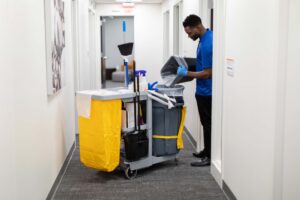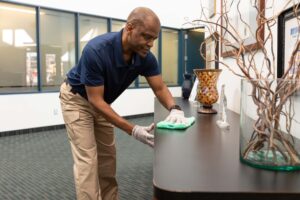As another school year approaches, administrators across the state face a familiar challenge: maintaining high standards of cleanliness and hygiene with increasingly stretched budgets.
In this landscape of fiscal prudence, one area often feeling the pinch is janitorial services.
However, cutting corners on cleanliness can have far-reaching consequences for student health, staff wellbeing, and overall learning outcomes.
This is where supplemental staffing for janitorial teams emerges as a smart, flexible solution that can help schools maintain pristine facilities without breaking the bank.
In this post, we’ll explore how supplemental staffing can benefit your school’s janitorial team, providing a cost-effective way to ensure your educational spaces remain clean, safe, and conducive to learning.
The Current Landscape of School Cleanliness:
Traditionally, most schools rely on in-house janitorial teams to keep their facilities clean. These dedicated staff members work tirelessly to maintain classrooms, hallways, cafeterias, and other spaces.
However, the current economic climate is putting unprecedented pressure on this model.
Budget constraints are causing school districts throughout the state to tighten their belts. Many are facing difficult decisions about resource allocation, and unfortunately, janitorial services often find themselves on the chopping block.
This can lead to reduced staff numbers, cutbacks in cleaning frequency, or the elimination of specialized cleaning tasks.
At the same time, the demands on cleaning staff have never been higher.
The ongoing need for rigorous hygiene protocols, coupled with increased awareness of the role cleanliness plays in preventing illness spread, means that janitorial teams are being asked to do more thorough cleaning, more often, and with fewer resources.
This perfect storm of increased demands and decreased resources can result in:
- Overworked janitorial staff struggling to keep up with cleaning needs
- Inconsistent cleaning standards across different areas of the school
- Neglect of less visible but equally important cleaning tasks
- Increased risk of illness spread among students and staff
- Negative impacts on the overall learning environment
It’s clear that a new approach is needed – one that allows schools to maintain high cleaning standards without exceeding their budgetary limitations.
This is where the concept of supplemental staffing comes into play, offering a flexible and cost-effective solution to these pressing challenges.
Understanding Supplemental Staffing:
Supplemental staffing is a strategic approach that allows schools to enhance their existing janitorial teams with additional support from professional cleaning services.
Unlike complete outsourcing, which replaces in-house staff entirely, supplemental staffing works in tandem with your current team to fill gaps, handle specialized tasks, or provide extra manpower during peak cleaning times.
This model offers several key advantages:
- Flexibility: Schools can scale their cleaning services up or down based on current needs and budget availability. For instance, you might bring in supplemental staff for deep cleaning during school breaks or to handle specific projects like floor refinishing.
- Cost-effectiveness: By utilizing supplemental staff, schools can avoid the overhead costs associated with hiring full-time employees, such as benefits, training, and equipment purchases.
- Expertise on demand: Professional cleaning companies often have specialized knowledge and equipment that may not be feasible for schools to maintain in-house. This allows schools to access high-level expertise when needed without the ongoing expense.
- Consistency: Supplemental staff can help maintain cleaning standards even when regular staff members are absent or during particularly busy periods.
Benefits of Supplemental Staffing for Schools:
Supplemental staffing offers numerous advantages for schools looking to maintain high cleaning standards while managing tight budgets.
One of the primary benefits is the optimization of budget allocation.
By utilizing supplemental staff, schools can maintain a core in-house team for daily tasks while bringing in additional support for peak cleaning times or specialized projects. This approach allows for more efficient use of resources, as schools aren’t paying for full-time staff during periods of lower demand.
The quality of cleaning often sees a marked improvement with supplemental staffing.
Professional cleaning services bring advanced techniques and state-of-the-art equipment that may not be feasible for schools to maintain in-house. This elevation in cleaning standards contributes to a healthier environment for students and staff, potentially reducing absenteeism due to illness.
Flexibility is another key advantage of supplemental staffing.
School cleaning needs can vary dramatically throughout the year, from routine daily cleaning to intensive deep cleans during breaks. Supplemental staffing allows schools to scale their cleaning efforts up or down as needed, ensuring that the facility always meets cleanliness standards without the burden of overstaffing during quieter periods.
By relieving some of the pressure on in-house janitorial staff, supplemental staffing allows school administrators and facilities managers to focus more on core educational activities.
Lastly, supplemental staffing provides access to specialized services that may not be cost-effective for schools to maintain in-house.
Whether it’s carpet deep cleaning, floor refinishing, or high-level sanitization, schools can tap into these specialized skills and equipment as needed, ensuring comprehensive care for all aspects of the facility.
Implementing Supplemental Staffing in Your School:
The process of implementing supplemental staffing in your school begins with a thorough assessment of your current cleaning needs.
Take time to evaluate your existing processes, identifying areas where additional support could be most beneficial. This might include high-traffic areas that require more frequent cleaning, specialized tasks that your in-house team isn’t equipped to handle, or periods of increased cleaning demand.
Next, you want to start the process of researching a cleaning partner.
When looking for a cleaning service, you will want to seek out those who understand the unique challenges of school environments, from the need for rapid turnaround between classes to the importance of using safe, child-friendly cleaning products.
The ideal partner will be able to work flexibly with your existing team, complementing their efforts rather than disrupting established routines.
Once you’ve selected a partner, you will want to clearly define their roles and responsibilities.
Ensure that there’s a well-defined division of tasks between your in-house team and supplemental staff to avoid confusion and ensure all areas are covered. This might involve creating detailed cleaning schedules or assigning specific zones or tasks to each team.
Finally, remember that implementing supplemental staffing is an ongoing process.
Regularly review the effectiveness of your arrangement and be prepared to make adjustments.
This might involve changing the frequency of supplemental staffing, adjusting the tasks assigned to each team, or scaling services up or down based on changing needs or budget constraints.
Preparing for the New School Year:
As we approach the start of another academic year, now is the perfect time to consider implementing a supplemental staffing strategy.
Here are some key considerations:
- Specialized Projects: Plan any major cleaning projects, such as carpet cleaning or floor refinishing, and consider how supplemental staff could help complete these tasks efficiently.
- Covid-19 Protocols: While many restrictions have eased, maintaining heightened cleanliness standards remains crucial. Supplemental staff can help ensure these protocols are consistently followed without overburdening your core team.
- Budget Planning: As you finalize your budget for the upcoming year, consider how supplemental staffing could help you allocate your cleaning resources more effectively.
- Training and Integration: If you decide to implement supplemental staffing, plan for any necessary training or integration activities to ensure a smooth transition.
Conclusion:
As you prepare for the upcoming school year, consider how supplemental staffing could benefit your janitorial team. Whether you need extra hands for deep cleaning, specialized services for specific projects, or ongoing support to maintain rigorous hygiene protocols, a well-planned supplemental staffing strategy can help you meet these needs efficiently and cost-effectively.
At 1 Stone Solutions, we understand the unique challenges faced by educational institutions.
We’re committed to partnering with schools to create clean, safe, and healthy learning environments while respecting budgetary constraints.
Our flexible supplemental staffing solutions can be tailored to your specific needs, ensuring that your facility remains in top condition throughout the school year.
Ready to explore how supplemental staffing could benefit your school?
Contact us today for a free consultation.



